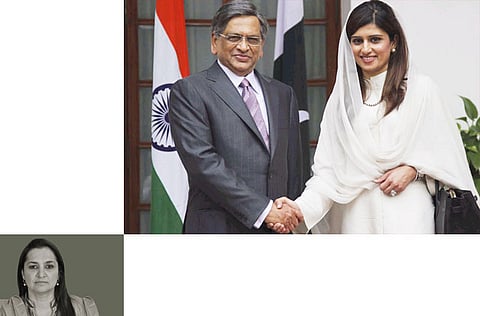All cheers for bilateral dialogue
Reviving multiple track engagement between India and Pakistan, home to millions of economically and socially-deprived citizens, is a welcome development

From Delhi the copy looks good. The smiles, handshakes, all the good words, hence great bonhomie. In an ordinary bilateral relationship this would merely mean atmospherics. Not in the case of Pakistan and India, who have fought wars, conducted covert operations against each other and pushed dialogues off track intermittently. As they met in New Delhi, the two foreign ministers, Pakistan's Hina Rabbani Khar and India's S.M Krishna, both called for "a renewed spirit of cooperation" and for "learning from history as opposed to letting it become a burden". The talk was glib. Both met after several successful rounds of bilateral talks on multiple issues. Although increased Confidence Building Measures (CBMs) to enhance trade and travel for the Kashmiris living on both sides of the Line of Control have been announced, the joint statement is in fact a note of intent to carry the dialogue process forward. Uninterrupted.
Last year, once the post-Mumbai attacks political dust settled down, which had aborted the 2009 Sharm Al Shaikh peace initiative of Pakistani Prime Minister Yousuf Raza Gilani and his Indian counterpart Manmohan Singh, in Thimpu, Bhutan, the two had again picked up the peace thread. With a multiple-issue Pakistan-India dialogue, the two met again in Mohali and reiterated the need for dialogue for peace and cooperation. "We must hear through the Arab Spring uprisings what our people too want from us," the two had agreed. This political commitment, the recognition of the futility of no-dialogue and also greater cooperation from Pakistan in the 2008 Mumbai attacks investigation, has kept the 2011 dialogue on track, despite the latest attack on Mumbai on July 13. Beyond the content, a decision on the structure of the dialogue process, the active revival of the Joint Ministerial Commission (JMC), will also be announced.
Sustained engagement
Reviving elaborate multiple track engagement between two nuclear states, home to millions of economically and socially-deprived citizens, who do not even have security, is a welcome development. Equally, New Delhi's decision to opt for a cooperative as opposed to a confrontational approach on Mumbai and Pakistan's decision to give the Most Favoured Nation status to India, are also important steps towards improving the context within which there can be substantive cooperation between the two countries. After all the regularity with which relations between the two country take a nose-dive, the significance of improving the context and bringing substantive dialogue back on track cannot be underestimated. Meanwhile, in the context of the changing regional environment, involving major troop withdrawals from Afghanistan, the search for a reconciliation formula for a post ISAF Afghanistan, the re-entry of Taliban and Pakistan's own comprehensive counter-terrorism thrust in the Federally Administered Tribal Areas, the budding problem of home grown Hindu and Muslim militancy within India, and India's vying for a permanent UN Security Council seat, have all contributed — though at varying degrees — to encourage Islamabad and Delhi to re-engage and insist that in this round they want a ‘sustained and meaningful' engagement.
The agreement on holding a composite dialogue, on its modalities and the eight issues was first worked out and announced during the Sharif-Gujral government in the joint statement of June 23, 1997, announced by the Pakistani and Indian foreign secretaries Shamshad Ahmad and Salman Haider, respectively. Working groups were to be set up to deal with eight issues: peace and security, including CBMs; Jammu and Kashmir; Siachen; Wular Barrage Project; Sir Creek; ‘terrorism and drug trafficking' — not ‘cross-border terrorism — economic and commercial cooperation; and the promotion of friendly exchanges in various fields. The foreign secretaries were to deal with peace and security and Kashmir, while "also co-ordinate and monitor the progress of work of all the Working Groups."
While this latest round of post-Mumbai diplomacy has improved the context of the bilateral relations, the socio-economic, ideological and security challenges that Pakistan and India are confronted with warrant movement on resolving outstanding problems. Clearly, unless there is serious intent on both sides to resolve outstanding issues that perpetuate suspicion and hostility, substantive bilateral cooperation and the revision of respective threat perceptions are unlikely to take place. And against the backdrop of acute economic, ideological and security crisis, our two states will gallop ahead towards greater militarisation of the region.
And the logic for the departure from the old ways to new ones, Sherry Rehman, parliamentarian and president of an independent think tank argues, "Pakistan and India do not need to confront each other in a G20 world, we need to leverage our regional advantages, and move beyond doctrinal straitjackets that limit us to mirroring rival security power-plays." She, as others do, argues for a new brand of strategic competition.
Nasim Zehra is a writer on security issues.


